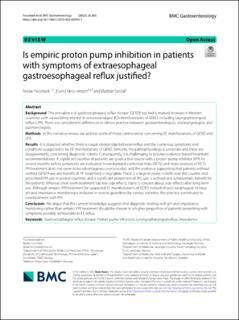| dc.contributor.author | Fossmark, Reidar | |
| dc.contributor.author | Ness-Jensen, Eivind | |
| dc.contributor.author | Sørdal, Øystein Finset | |
| dc.date.accessioned | 2024-01-17T12:10:34Z | |
| dc.date.available | 2024-01-17T12:10:34Z | |
| dc.date.created | 2024-01-04T10:24:03Z | |
| dc.date.issued | 2023 | |
| dc.identifier.citation | BMC Gastroenterology. 2023, 23 303-303. | en_US |
| dc.identifier.issn | 1471-230X | |
| dc.identifier.uri | https://hdl.handle.net/11250/3112157 | |
| dc.description.abstract | Background
The prevalence of gastroesophageal reflux disease (GERD) has had a marked increase in Western countries with a paralleling interest in extraesophageal (EE) manifestations of GERD, including laryngopharyngeal reflux (LPR). There are considerable differences in clinical practice between gastroenterologists, otolaryngologists and pulmonologists.
Methods
In this narrative review we address some of these controversies concerning EE manifestations of GERD and LPR.
Results
It is disputed whether there is causal relationship between reflux and the numerous symptoms and conditions suggested to be EE manifestations of GERD. Similarly, the pathophysiology is uncertain and there are disagreements concerning diagnostic criteria. Consequently, it is challenging to provide evidence-based treatment recommendations. A significant number of patients are given a trial course with a proton pump inhibitor (PPI) for several months before symptoms are evaluated. In randomized controlled trials (RCTs) and meta-analyses of RCTs PPI treatment does not seem to be advantageous over placebo, and the evidence supporting that patients without verified GERD have any benefit of PPI treatment is negligible. There is a large increase in both over the counter and prescribed PPI use in several countries and a significant proportion of this use is without any symptomatic benefit for the patients. Whereas short-term treatment has few side effects, there is concern about side-effects after long-term use. Although empiric PPI treatment for suspected EE manifestations of GERD instead of prior esophageal 24-hour pH and impedance monitoring is included in several guidelines by various societies, this practice contributes to overtreatment with PPI.
Conclusion
We argue that the current knowledge suggests that diagnostic testing with pH and impedance monitoring rather than empiric PPI treatment should be chosen in a higher proportion of patients presenting with symptoms possibly attributable to EE reflux. | en_US |
| dc.language.iso | eng | en_US |
| dc.publisher | BioMed Central Ltd. | en_US |
| dc.rights | Navngivelse 4.0 Internasjonal | * |
| dc.rights.uri | http://creativecommons.org/licenses/by/4.0/deed.no | * |
| dc.title | Is empiric proton pump inhibition in patients with symptoms of extraesophageal gastroesophageal reflux justified? | en_US |
| dc.title.alternative | Is empiric proton pump inhibition in patients with symptoms of extraesophageal gastroesophageal reflux justified? | en_US |
| dc.type | Peer reviewed | en_US |
| dc.type | Journal article | en_US |
| dc.description.version | publishedVersion | en_US |
| dc.source.pagenumber | 303-303 | en_US |
| dc.source.volume | 23 | en_US |
| dc.source.journal | BMC Gastroenterology | en_US |
| dc.identifier.doi | 10.1186/s12876-023-02945-7 | |
| dc.identifier.cristin | 2220444 | |
| cristin.ispublished | true | |
| cristin.fulltext | original | |
| cristin.qualitycode | 1 | |

